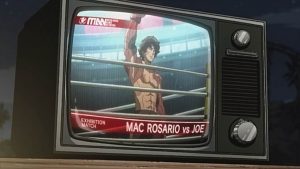 I had my immediate impressions of that ending, of course, which I’ll share. But with a bit of distance (even an hour or so) it seems to me that this is the sort of finale that’s going to evolve in my mind long after it’s finished airing. My schedule just doesn’t allow for me to take a day or two to digest this, but as a result I feel as if these are preliminary impressions to an extent. Nothing wrong with that I guess – and Nomad will have its chance to measure itself in my consciousness when the end of the year rolls around.
I had my immediate impressions of that ending, of course, which I’ll share. But with a bit of distance (even an hour or so) it seems to me that this is the sort of finale that’s going to evolve in my mind long after it’s finished airing. My schedule just doesn’t allow for me to take a day or two to digest this, but as a result I feel as if these are preliminary impressions to an extent. Nothing wrong with that I guess – and Nomad will have its chance to measure itself in my consciousness when the end of the year rolls around.
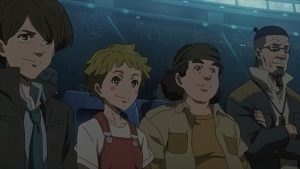 The truth is, whatever criticism I have is really the kind you reserve for shows that set themselves the highest of standards. Megalo Box 2 was certainly the best series of the season, will be in the conversation for best of the year, and generally operated at a level few anime even aspire to. The ending? Well, my initial reaction – unvarnished and unembellished – was that it was just a bit of an anticlimax. I did think the postscript was the best part of it, and the most emotionally resonant – but even that triggered a couple of slight quibbles in my mind.
The truth is, whatever criticism I have is really the kind you reserve for shows that set themselves the highest of standards. Megalo Box 2 was certainly the best series of the season, will be in the conversation for best of the year, and generally operated at a level few anime even aspire to. The ending? Well, my initial reaction – unvarnished and unembellished – was that it was just a bit of an anticlimax. I did think the postscript was the best part of it, and the most emotionally resonant – but even that triggered a couple of slight quibbles in my mind.
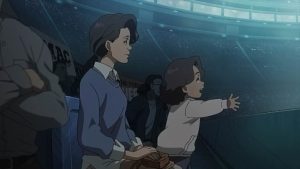 The first thing I want to address is the question of consequence. I think Megalo Box broke the Ashita no Joe mold already at the end of S1, so no one should be surprised at what did (or didn’t happen) at the end of this episode. And as I like all these characters and especially Joe and Sacchio, I certainly wasn’t rooting for anyone to die. That said, I wonder if the fact that everybody walked away from this match happier and healthier than they started undercuts the themes of the series a little bit. Hell, even the wolf walked away (so what the heck was the deal with the stony grave in the OP, then?).
The first thing I want to address is the question of consequence. I think Megalo Box broke the Ashita no Joe mold already at the end of S1, so no one should be surprised at what did (or didn’t happen) at the end of this episode. And as I like all these characters and especially Joe and Sacchio, I certainly wasn’t rooting for anyone to die. That said, I wonder if the fact that everybody walked away from this match happier and healthier than they started undercuts the themes of the series a little bit. Hell, even the wolf walked away (so what the heck was the deal with the stony grave in the OP, then?).
 Maybe Sakuma faced some consequences – pretty light ones considering his offenses, IMO, but he didn’t skate off scot-free. Yukiko blackmailed him, in effect – what threw him was her willingness to take herself down along with him. Which she did, to an extent, apparently stepping down (presumably to avoid being pushed out) as president of Shirato. That, and Yoshimura selling him out – and while she eventually did do the right thing, one could argue that her facing no consequences apart from a guilty conscience was a pretty big let-off in itself.
Maybe Sakuma faced some consequences – pretty light ones considering his offenses, IMO, but he didn’t skate off scot-free. Yukiko blackmailed him, in effect – what threw him was her willingness to take herself down along with him. Which she did, to an extent, apparently stepping down (presumably to avoid being pushed out) as president of Shirato. That, and Yoshimura selling him out – and while she eventually did do the right thing, one could argue that her facing no consequences apart from a guilty conscience was a pretty big let-off in itself.
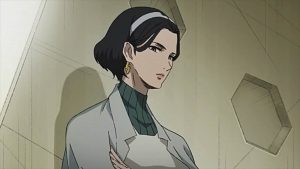 Let’s talk about the fight itself, then. This is a funny one, because I’ve been feeling for a while that the series never did enough to justify why this fight should happen. And in the end, it was a pretty big anti-climax in its own right. Certainly from Mac’s perspective it’s easier to defend than Joe’s, and I’m still not sure what Joe got out of it that was worth risking his life for. Mac wanted to prove he could be a champion without (effectively) doping, which he did – perhaps a bit too easily, one might argue. What about Joe? What did he have to prove at this point, and what did he owe to Mac?
Let’s talk about the fight itself, then. This is a funny one, because I’ve been feeling for a while that the series never did enough to justify why this fight should happen. And in the end, it was a pretty big anti-climax in its own right. Certainly from Mac’s perspective it’s easier to defend than Joe’s, and I’m still not sure what Joe got out of it that was worth risking his life for. Mac wanted to prove he could be a champion without (effectively) doping, which he did – perhaps a bit too easily, one might argue. What about Joe? What did he have to prove at this point, and what did he owe to Mac?
 I don’t think there’s any question that the key narrative moment of the fight was Sacchio’s decision to throw in the towel. Joe leaving that decision in Sacchio’s hands was important, I certainly won’t deny that. And I don’t think Sacchio can be blamed for doing what he did, but here’s my problem with it. The fight was in the second round, and basically even. Joe and Mac were beating on each other pretty good but hey, that’s boxing. Joe certainly wasn’t out on his feet, or showing any signs of serious injury. Sacchio throwing in the towel – and Joe being fine with it – says to me more than anything that the fight really was unnecessary. In effect, Nomad acknowledged that this climax was a false one.
I don’t think there’s any question that the key narrative moment of the fight was Sacchio’s decision to throw in the towel. Joe leaving that decision in Sacchio’s hands was important, I certainly won’t deny that. And I don’t think Sacchio can be blamed for doing what he did, but here’s my problem with it. The fight was in the second round, and basically even. Joe and Mac were beating on each other pretty good but hey, that’s boxing. Joe certainly wasn’t out on his feet, or showing any signs of serious injury. Sacchio throwing in the towel – and Joe being fine with it – says to me more than anything that the fight really was unnecessary. In effect, Nomad acknowledged that this climax was a false one.
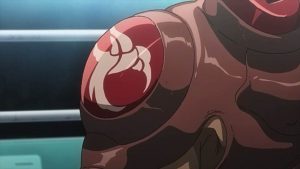 I applaud Sacchio for caring more about Joe’s life than his machismo, or the fight. Sacchio loves Joe like a father, he damn well should feel that way. But Joe walked into that ring suffering from signs of CTE, and Mac was redlining randomly because of the chip in his head. And both of them are just fine? I mean I’m glad they’re just fine, but it does feel like a bit of a cop-out (and the mutt was icing on the cake). It was all just kind of odd – poetically satisfying in a certain sense, but it doesn’t feel like the ending this series was building towards for most of its run.
I applaud Sacchio for caring more about Joe’s life than his machismo, or the fight. Sacchio loves Joe like a father, he damn well should feel that way. But Joe walked into that ring suffering from signs of CTE, and Mac was redlining randomly because of the chip in his head. And both of them are just fine? I mean I’m glad they’re just fine, but it does feel like a bit of a cop-out (and the mutt was icing on the cake). It was all just kind of odd – poetically satisfying in a certain sense, but it doesn’t feel like the ending this series was building towards for most of its run.
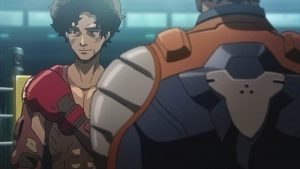 I’ve noted it before, but I liked this show better when it was Nomad than when it became Megalo Box 2. It probably wasn’t realistic to expect it to follow the course of its first half for its entire run – a conventional plot was probably inevitable. But it went from poetry to prose, in effect – and something of the specialness did ebb away a bit when that transition happened. I would much rather have seen a show about Joe trying to rebuild his life without boxing and trying to repair his relationship with Sacchio. None of what happened after Episode 6 – Mac, BES, the ROSCO subplot – was as resonant as that would have been.
I’ve noted it before, but I liked this show better when it was Nomad than when it became Megalo Box 2. It probably wasn’t realistic to expect it to follow the course of its first half for its entire run – a conventional plot was probably inevitable. But it went from poetry to prose, in effect – and something of the specialness did ebb away a bit when that transition happened. I would much rather have seen a show about Joe trying to rebuild his life without boxing and trying to repair his relationship with Sacchio. None of what happened after Episode 6 – Mac, BES, the ROSCO subplot – was as resonant as that would have been.
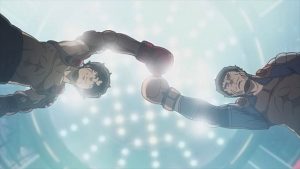 But it must be reiterated – Megalo Box 2 only suffers when you grade it on a curve and the class is only two students. On an absolute level is was still elite-tier anime. And all the wonderful things this series did far outweigh any leveling off in the second half. As an exploration of the immigrant experience it was as good as I’ve ever seen in anime – while this was clearly a stand-in for the struggle of immigrants in Japan (a much tougher sell), the writing didn’t remotely skimp on authenticity. Hell, we even got a cameo for Braai – South African barbecue – in the epilogue.
But it must be reiterated – Megalo Box 2 only suffers when you grade it on a curve and the class is only two students. On an absolute level is was still elite-tier anime. And all the wonderful things this series did far outweigh any leveling off in the second half. As an exploration of the immigrant experience it was as good as I’ve ever seen in anime – while this was clearly a stand-in for the struggle of immigrants in Japan (a much tougher sell), the writing didn’t remotely skimp on authenticity. Hell, we even got a cameo for Braai – South African barbecue – in the epilogue.
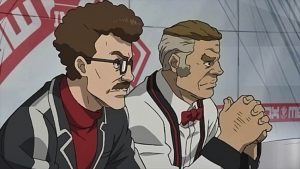 Yeah, on balance this series was pretty great. Subtle and nuanced character writing, phenomenal music, top-notch performances by the cast. Frankly I think it and its predecessor trump anything that came before it in the franchise, but either way Megalo Box expertly walked the tightrope between honoring tradition and forging its own path. Anime is so well-served when it goes outside the usual suspects for writers, styles, and themes – the medium has become far too formulaic for its long-term health. It’s not that shows like Nomad don’t seem like anime – it’s that they don’t respect the artificial creative limits anime places on itself.
Yeah, on balance this series was pretty great. Subtle and nuanced character writing, phenomenal music, top-notch performances by the cast. Frankly I think it and its predecessor trump anything that came before it in the franchise, but either way Megalo Box expertly walked the tightrope between honoring tradition and forging its own path. Anime is so well-served when it goes outside the usual suspects for writers, styles, and themes – the medium has become far too formulaic for its long-term health. It’s not that shows like Nomad don’t seem like anime – it’s that they don’t respect the artificial creative limits anime places on itself.
Epilogue:


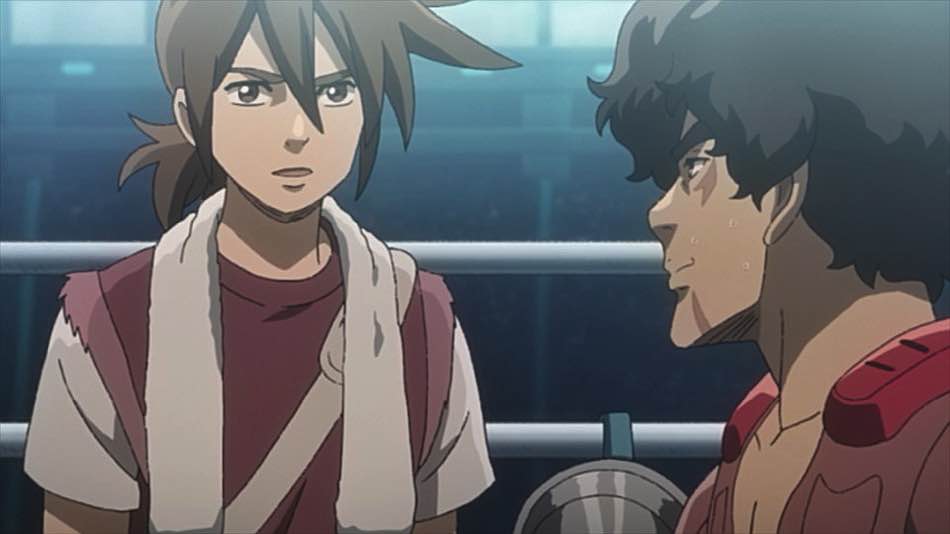
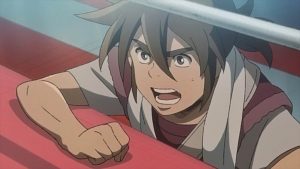
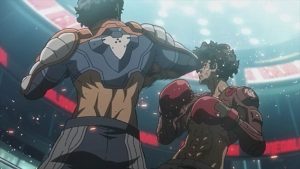
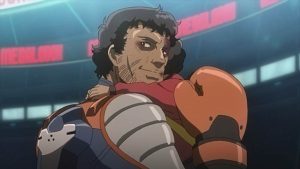
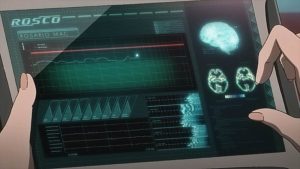
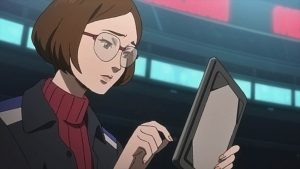
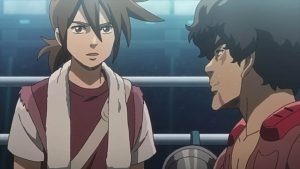
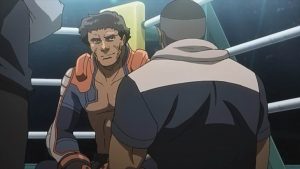
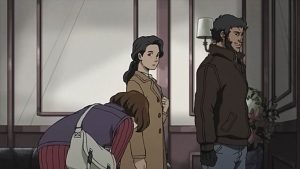
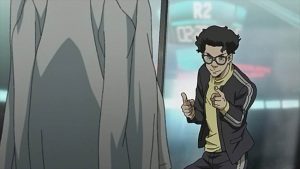
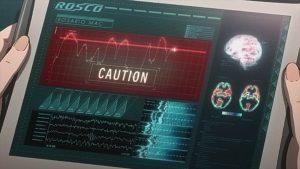
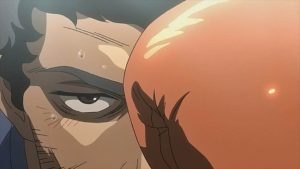
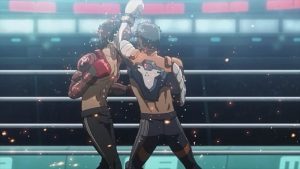

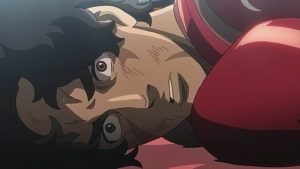
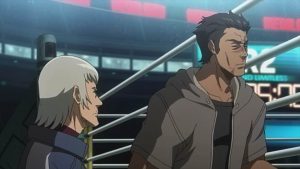
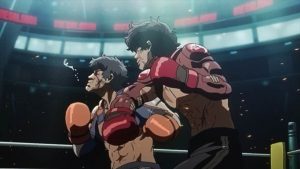
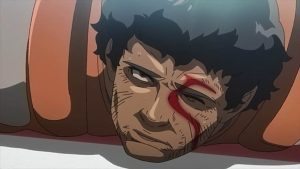
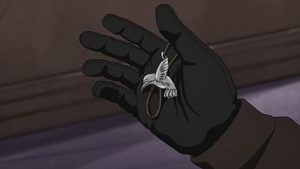
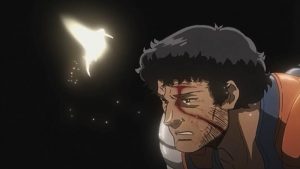
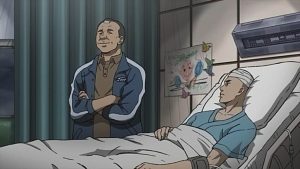

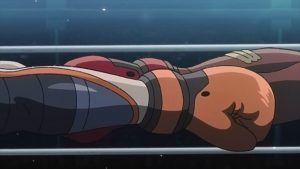
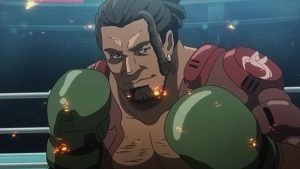
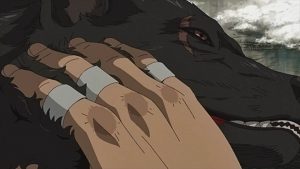
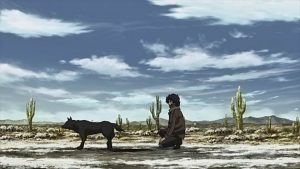

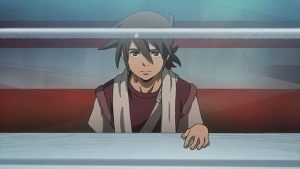
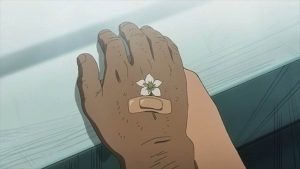
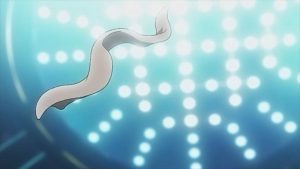
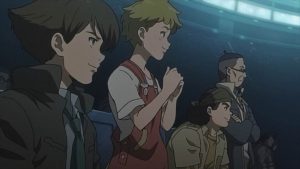
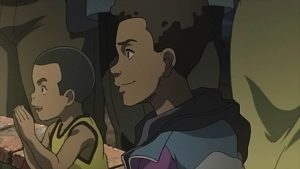
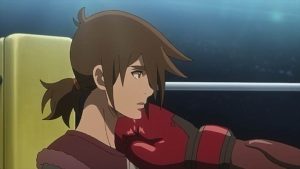
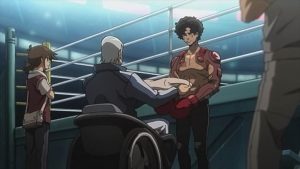
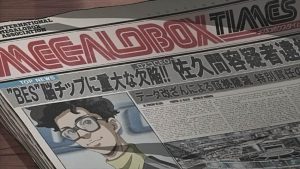
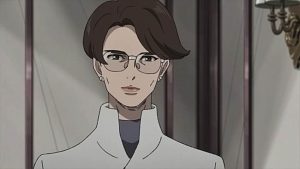
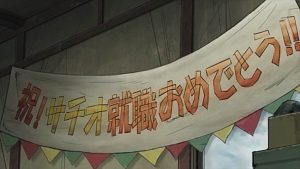
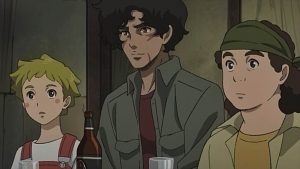
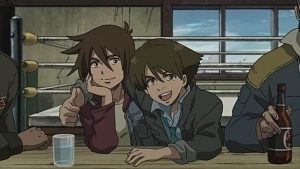
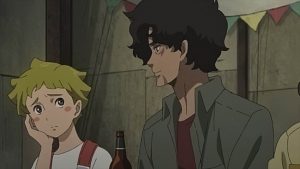
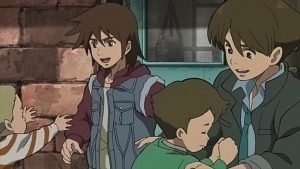
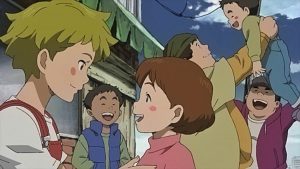
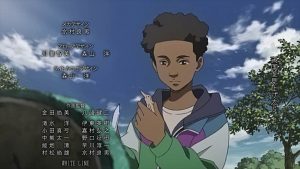
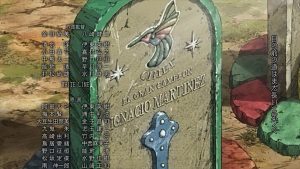
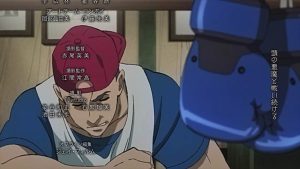
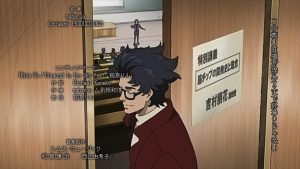
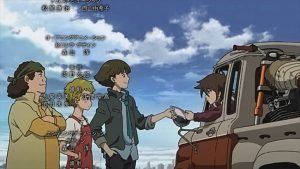
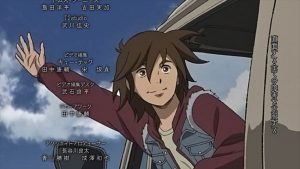
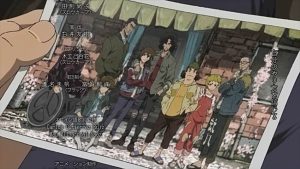
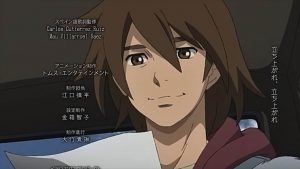
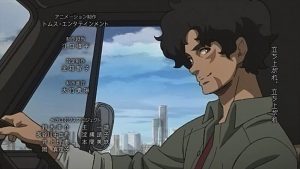






leongsh
June 29, 2021 at 1:51 amLet’s get this one out of the way first:
The one inscribed with “Nomad”? That’s Joe laying to rest his wandering alter-ego, Nomad, and returning home to the kids and the gym.
Re: The Fight
The whole fight was 2 people being pulled together to fight in the ring but events building up from the last 2 episodes came to a head in Episode 13 where instead of just rushing headlong into their respective oblivions, both Mac and Joe found their way back from the precipice. Mac by turning to Yukiko and the Shirato group to work out their path forward, while Joe had earlier agreed to leave it to Sachio to decide when to throw in the towel and not question it.
While we are detached from some parts of the fight to watch Yukiko tighten the screw and blackmail Sakuma, the in-universe feedback of the boxing match is represented by Liu and his manager who are both impressed and inspired by the bout. Mac floored Joe first (and he suffered the risk of blackout), and then Joe managing to knock Mac down later (which risked the BES triggering). Both of them were each at the precipice.
Joe was reverting to his old self in wanting to take the fight further to Mac who has slowly but surely getting the upper hand. Sachio at that point recognised it but did not have the heart to throw in the towel because he saw the eagerness of Joe. However, the ghost of Namba counseled Sachio to think of the trust that Joe gave Sachio that he would abide by Sachio’s decision if he threw in the towel. And in which he did.
The message here is that while both sides are pulled inexorably towards fighting this match, they still can have this match and get what they want without needing to go all the way to risk their lives further. They can step away from the ring thereafter on their own terms. Most stories would have let the fight play out with either side of both risking further long term damage but Megalo Box 2 goes down the less traveled path of knowing when to pull back.
Real life message? We do not need to go all the way to beat down the other. We have the option of stopping and making peace. That what is more important is the rest of the life that you have to live, rather than go down the path of self-destruction.
It’s a message different from Ashita No Joe and delivered in the context of time that is also very different from Ashita no Joe. The highly flawed scoundrel titular character of Ashita no Joe, Joe Yabuki, wanted to do is summarised in his declaration that he is pursuing boxing until “All that will be left is pure, white, ash…” To burn so bright in boxing that it would consume him and he would leave nothing behind but pure white ash. In current day, it would be called self-destructive. In those days and context, he was very much a Japanese embodiment of the famous quote from Henry David Thoreau that was popularised outside of literary circles by “The Dead Poets Society”, i.e.
The Joe in Megalo Box is a different type of Joe (sorry for the pun). It deserves a different story and ending and in which the writers did give and aced it.
leongsh
June 29, 2021 at 1:53 amOops.. the formatting at the end needs correction. Hope you can help there, Guardian Enzo.
Austin
June 29, 2021 at 3:06 amAll of this. You understood. Thank you
abc
June 29, 2021 at 7:13 amAs Mikio said a few episodes back: “Realizing you’ve made a mistake and stopping is moving towards the future too.”
kiwi
July 27, 2021 at 2:58 pmreally like your comment! I quite enjoyed this series but i agree with Enzo that the emotional climax was Sachio forgiving Joe, not the final match.
Riv
July 11, 2021 at 3:41 amA late comment, but I was only just able to watch the finale. Like you, I hadn’t been completely engaged by the whole BES subplot of the second half–or rather, it held my interest, but I wasn’t sure it would be concluded in a satisfying manner. But for me, the last episode really nailed it and brought it together in a very satisfying way that tied the first part to the second. I would agree with the previous commenters about the deeper meaning of the story–about recognizing when to stop and choose a different path. I would also add to that the ability to give up something you love/believe in when that dream has become flawed or will end up hurting yourself and others. With BES, many of the people, with the exception of Sakuma, were initially committed to it as a way to help people. And with Joe, it was obvious that he still loved boxing–and was still very skilled at it. As a character, Joe often seemed to rely on other people to push him in the right directions. Chief did so in the first half, and now Sachio did it here. I don’t know that on his own, Joe would have been able to give up on boxing or say no to that last fight. And clearly Sachio could see how much boxing still meant to Joe and was reluctant to sever that. It’s hard to ask people to give up what they love. So for me, the final fight wasn’t meaningless or unnecessary. Could the story still have been just as effective without the whole BES thing? Probably, but I do feel like they effectively tied it all together at the end.